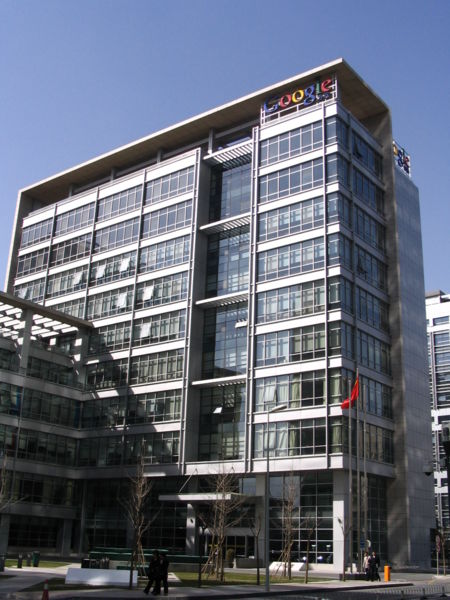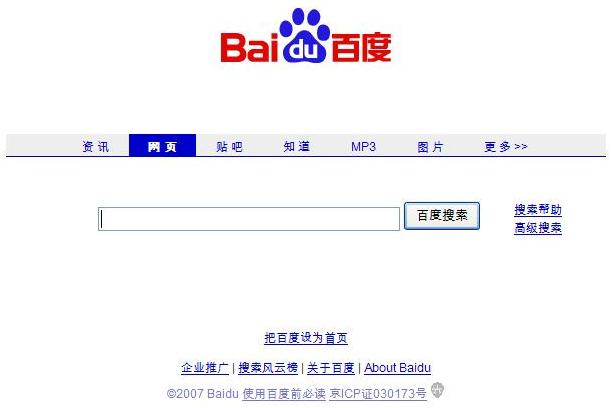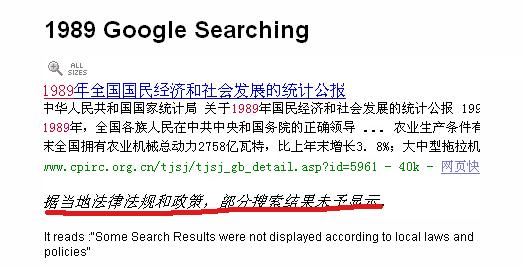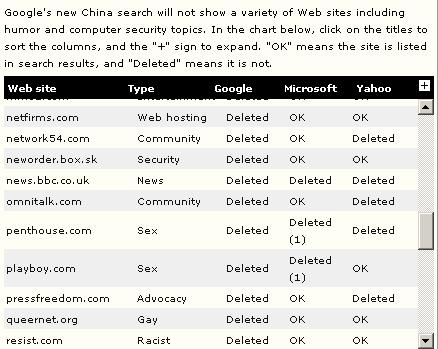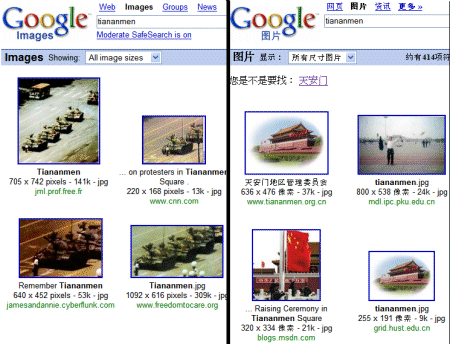Courses/Computer Science/CPSC 203/CPSC 203 2007Summer L60/CPSC 203 2007Summer L60 TermProjects/Google Censorship in China
Contents
Team Members
Ice Chan
Sharmin Bajwa
Brandy O'Ferrall
Initial Project Statement
Since it was founded in 1998 the popular website Google has been known as a business with a conscience which is somewhat of an anomaly in today’s corporate world. But recently their company has made the decision to set up a new self-censored site in China in order to comply with Chinese laws and regulations. Have they compromised their integrity by doing so? This is what we will look into.
Argument
"Don't be evil". That is one of Google's corporate mantras. Elliot Schrage, Vice President of Global Communications and Public Affairs for Google Inc., says the mantra is "an admonition that reminds us to consider the moral and ethical implications of every single business decision we make". However one decision made recently by Google seems in direct contradiction to their "Don't be evil" hymn and it has people wondering whether or not they can still be singing this tune. The decision was to set up a new self-censored site in China. Although Google has offered a Chinese-language form of its search engine for years users have found it difficult to use because of government blocks on the site. Google is expecting the new site will be faster and easier to use but it could also limit access to topics such as independence for Taiwan and the 1989 Tiananmen Square massacre. The company states, "While removing search results is inconsistent with Google's mission, providing no information (or a heavily degraded user experience that amounts to no information) is more inconsistent with our mission." But is Google's mission really more about achieving profit than making ethical business decisions and providing web users with information? The number of search engine users in China is expected to increase from approximately 100 million presently to 187 million in the next two years. Google could be missing out on a good thing, to say the least. A survey done last August showed that Google was losing market share to the Beijing search engine Baidu.com. Has Google compromised its once noble goal of placing ethics above the almighty dollar?
Brief History of Google China
Google China was founded in 2005 and is headed by Kai-Fu Lee, a former Microsoft Executive and the founder, in 1998, of Microsoft Research Asia. In July, 2005 he was hired away from Microsoft and devoted himself to the operation of Google China. His main goal is to uphold Google's mission and forward information to the masses and people in his country.
Kai-Fu Lee has created an equation to praise Google which is found on his personal website. It translates to: "Youth + freedom + equality + bottom-up innovation + user focus + don't be evil = The Miracle of Google."
At first Google greatly opposed censoring any of its search results but finally after weighing out the costs and benefits of continuing the operation of Google in China they found that if they were to pull out right now it would not be financially beneficial to their company. As a result of this Google has decided to conform to censorship laws within China.
Why the Interest in China?
With a population of 1.3 billion people and more than 100 million Internet users, China's largely untapped Internet market is very attractive to technology companies who are wanting to profit from it. Google is opening a research and development center in China and owns a stake in Baidu.com ,(the leading Chinese search engine which can search websites, audio files, and images-it also has an online collaboratively-built encyclopedia similar to Wikipedia), which has gained in popularity and done very well financially within Chinese markets. Like Google China, Baidu has complied with the policies of Internet censorship in China by creating a self censorship program within its Chinese-language version of itself so that it removes controversial material from its search results.
Google in the Chinese Market
From research it was found that Google China serves a market of Chinese Internet users that was estimated in June 2007 to include over 162 million people. This estimate is up from 45.8 million in June 2002, according to a survey from the China Internet Network Information Center (CNNIC), released on June 30, 2002. China, in many aspects, is a growing economy and has a large population and space for investment and expansion which is why not just manufacturers but even people in technology are looking towards China as a place to expand their company. In this case we have seen the expansion of search-engine businesses into China through collaberation with the Chinese government. As the local website Baidu takes on popularity within China and is reaping financial benefits within China, Google China had seen this fabulous opportunity and has expanded its investments into China to reap financial income from this growing country.
Controversy: Censorship
The Chinese government, being very strict with what they would or would not like their people to see, is seen directly through Google China. To obey this and continue its operation Google China has agreed to self-filter its Chinese search-engine. For example, websites promoting Falun Gong, a government-banned spiritual movement; sites promoting free speech in China; or any mention of the 1989 Tiananmen Square massacre, are all information the Chinese goverenment disapproves of and so such websites will not show up in search results. If you search for "Tibet" or "Falun Gong" most anywhere in the world on google.com, you'll find thousands of blog entries, news items and chat rooms on Chinese repression. Do the same search inside China on google.cn, and most, if not all of these websites will either be erased, blocked or removed by some other means so as to not allow people to access to them. The censorship will partially be based upon the Golden Shield Project that is ongoing within China.
Golden Shield Project
The Golden Shield Project, sometimes referred to as the Great Firewall of China, is a censorship and surveillance project operated by the Ministry of Public Security of the People's Republic of China (MPS). This project started in 1998, and began the process in November of 2003.
Censoring functions in this project includes:
1) IP blocking. The access to a certain IP address is denied.
2) DNS filtering and redirection. Doesn't resolve domain names, or returns incorrect IP addresses. This affects all TCP protocols such as HTTP, FTP or POP.
3) URL filtering. Scan the requested Uniform Resource Locator (URL) string for target keywords regardless of the domain name specified in the URL. This affects the HTTP protocol.
4) Packet filtering. Terminate TCP packet transmissions when a certain amount of controversial keywords are detected.
5) Connection reset. If a previous TCP connection is blocked by the filter, future connection attempts from both sides will also be blocked for up to 30 minutes.
Contents censored in China include:
1) Websites, blogs or any other forms and types of information discussing Falun Gong and democracy activists.
2) News sources that often cover some taboo topics such as police brutality, the Tiananmen Square protests of 1989, freedom of speech, democracy, and Marxist sites. Some of the sites already censored that include these type of information are: Voice of America, BBC News, and Yahoo Hong Kong.
3) Sites related with Taiwan government, media, or other organizations, including sites dedicated to religious content, such as CBETA, a site that provides the complete Chinese Buddhist canon.
4) Basically all websites containing obscenity, pornography and criminal activity.
5) Any website linked with the Dalai Lama and his International Tibet Independence Movement, including his teachings.
6) Websites deemed "subversive".
According to the New York Times, Google has set up programs and systems within its country to access websites outside its country. If a site is inaccessible, then it is added to Google China's blacklist. However, once unblocked, the websites will be reindexed. This was visible last summer when one of the New York times articles was published on its website and was blocked for a few days afterwards. Once a website and its contents are seen to give out information the Chinese government disapproves of the website will immediately be blocked. After the filter process it may be unblocked in the future but some will be backlisted on Google China's search engine and will no longer be found as its search results.
Self Censorship Explained
One part of the block, according to the Golden Shield Project, is to filter the search results of certain terms on Chinese search engines. These search ingines include ones within China and ones outside of the country. These search engines have incuded both international ones such as Yahoo and Google China (google.cn) and a domestic website named Baidu. In Chinese seach engines if censored words are attempted to be searched no results will be found as a result of the self-censorship. For Google china if the same concept was tried with searching for censored terms a message will be displayed on the bottom of the page, "According to the local laws, regulations and policies, part of the searching result is not shown."
Before self-censoring was popular the simplest way to cope with censorship rules within China was to block the search-engines themselves. Some of these included Google and AltaVista as well as Technorati, a search engine for blogs.
Example:
A search for "teen pregnancy" through Google's U.S. Web site lists the group's home page as the first result. But in an identical search through Google.cn, the campaign's Web site is not listed. Google does not inform users that it was deleted.
Here's an example which shows a screen capture, side by side (Google China versus Google US) of a search on "tiananmen" at Google Images China versus Google Images US.
So basically when the term "tiananmen" is searched in the US Google one gets pictures of tanks and information about the actual "Tiananmen Square" incident but if the same term was searched within Google China all one would get as their results would be peacuful pictures of the square-all pictures of protests and tanks would have been self-censored out of the system.
Users are not always informed that websites have been eliminated so they would not know that these websites even exist and are currently in operation outside of China.
"Don't be Evil"
By building a self-censorship filtering program within Google China's system it highly contradicts Google's mission statement to make information freely available to everybody on the planet and it also contradicts its motto: "don't be evil." When self-censorship is put into action Google China has moved futher away from Google's mission statement which is to allow all the information within its search engine to be freely available to everyone.
"Don't be evil" is a short motto to sum up Google's mission staement to make all information free for everyone that uses their search engine but Google China, with its self-censorship filter program, has written out this motto and has gone down a different path, away from Google's main mission statement. Google officials characterized the censorship concessions in China as an excruciating decision for a company that adopted "don't be evil" as a motto. But management believes it's a worthwhile sacrifice and according to Andrew McLaughlin, Google's senior policy counsel, the company believes that in the future "Google can make meaningful and positive contributions to the already impressive pace of development in China".
Other Functions of Google Banned and Why?
According to a few websites it was found that Google China is not going to offer some Google products, such as Gmail or Blogger, on google.cn because the company doesn't want to risk being ordered by the government to turn over anyone's personal information. The e-mail service Gmail, creates a huge database of users' messages and makes them instantly searchable. The blogging services contain a wide range of personal background.
Last year Yahoo came under fire after it provided the government with the e-mail account information of a Chinese journalist who was later convicted of violating state secrecy laws. Even though Google does not want similar incidents to occur on other websites it stated that if needed the government can still be able to track someone through IP addresses. So in one way Google China is trying to protect citizens of China that are using its search engine but there are other factors that the search engine itself can't control and one of these is the pinpointing of an individual or group via IP addresses.
Other Issues Revolving Google China
Issues Regarding Google China Itself
Regarding Google China and its self-censorsing system: according to some people on the internet they have found a flaw within the self- censoring system. This problem is a common spelling error made by many people and it is a factor that Google China has left out in creating their self-filtering system. Previously posted was a picture depicting the search results for photos for the term "Tiananmen" for both the US Google and Google China. Some people have found that if you search for common misspellings like "Tienanmen," "Tianenmen," or "Tiananman," you get photos of tanks just like the search results for photos of the term "Tiananmen" within the US Google. Testing this mispelling out has proven that mispellings are something Google China has definitely left out and so photos of tanks and the protest are not censored out of their system.
Outside Issues Targeted at Google China
From a website posted Feb. 5, 2006 with an article labelled Melt Down: Google's China Syndrome it shows how people outside of China are protesting against Google China. This was highly visible at the University of California, Berkeley: they drew protesters who shouted down Google China President Kai-Fu Lee demanding he account for the company's acquiescence to China's censorship of the internet.
External Links
Video Link
Ice:
http://www.nytimes.com/2006/04/23/magazine/23google.html?ex=1303444800&en=972002761056363f&ei=5090
http://en.wikipedia.org/wiki/Google_China#Business
http://en.wikipedia.org/wiki/Golden_Shield_Project
http://en.wikipedia.org/wiki/Internet_censorship_in_the_People%27s_Republic_of_China#Search_engines
http://www.breitbart.com/article.php?id=D8FBCF686&show_article=1
http://rconversation.blogs.com/rconversation/2006/01/google_in_china.html
http://news.com.com/No+booze+or+jokes+for+Googlers+in+China/2100-1030_3-6031727.html
http://news.com.com/Google+to+censor+China+Web+searches/2100-1028_3-6030784.html
http://www.breitbart.com/article.php?id=D8FBCF686&show_article=1
http://googleblog.blogspot.com/2006/02/testimony-internet-in-china.html
http://www.nytimes.com/2006/04/23/magazine/23google.html?ex=1303444800&en=972002761056363f&ei=5090
Sharmin:
http://news.bbc.co.uk/1/hi/technology/4645596.stm
http://www.cnn.com/2006/BUSINESS/01/25/google.china/index.html
http://googleblog.blogspot.com/2006/01/google-in-china.html
http://ice.citizenlab.org/?p=206
http://www.wired.com/science/discoveries/news/2006/01/70081
http://blogoscoped.com/archive/2007-03-02-n19.html
http://www.guardian.co.uk/china/story/0,,1934378,00.html
http://news.com.com/Google+to+censor+China+Web+searches/2100-1028_3-6030784.html
http://blog.searchenginewatch.com/blog/060125-072617
http://www.breitbart.com/article.php?id=D8FBCF686&show_article=1
http://en.wikipedia.org/wiki/Google_China
http://blogoscoped.com/archive/2006-01-26-n87.html
Brandy:
http://news.bbc.co.uk/1/hi/technology/4645596.stm
http://www.wired.com/science/discoveries/news/2006/01/70081
http://edition.cnn.com/2006/BUSINESS/01/25/google.china/
http://www.google-watch.org/china.html
http://www.boingboing.net/2006/02/14/exiled_tibetans_in_d.html
http://money.cnn.com/2006/01/30/technology/browser0130/index.htm
http://blog.searchenginewatch.com/blog/041004-163032
http://www.wired.com/politics/law/news/2004/09/65089
http://www.pure-mirage.com/images/Gallery_Images/Maya/images/3d_Apple_Logo_102.jp


